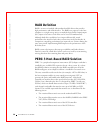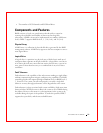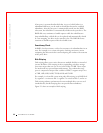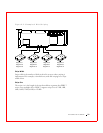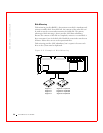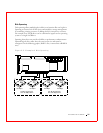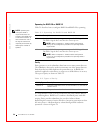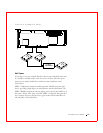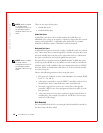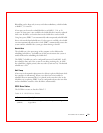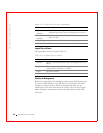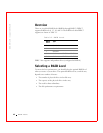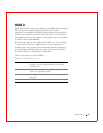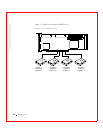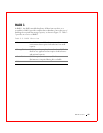
38 Introduction to RAID
www.dell.com | support.dell.com
NOTE: Refer to Chapter
11 "PERC 3 BIOS
Configuration Utility" for
the procedures used to
designate a drive as a hot
spare.
There are two types of hot spares:
• Global Hot Spare
• Dedicated Hot Spare
Global Hot Spare
A global hot spare drive can be used to replace any failed drive in a
redundant array as long as its capacity is equal to or larger than the coerced
capacity of the failed drive. A global hot spare defined on any channel
should be available to replace a failed drive on both channels.
Dedicated Hot Spare
A dedicated hot spare can be used to replace a failed drive only in a selected
array. One or more drives can be designated as member of a spare drive pool;
the most suitable drive from the pool is selected for fail over. A dedicated
hot spare is used before one from the global hot spare pool.
NOTE: Refer to Chapter
11"PERC 3 BIOS
Configuration Utility" for
the procedures used to
designate a drive as a hot
spare.
Hot spare drives can be located on any RAID channel. Standby hot spares
(not being used in RAID array) are polled every 60 seconds at a minimum,
and their status made available in the array management software. PERC 3
offers the ability to rebuild with a disk that is in a system, but not initially
set to be a hot spare.
Observe the following parameters when using hot spares:
• Hot spares are used only in arrays with redundancy, for example, RAID
levels 1, 5, 10, and 50.
• A hot spare connected to a specific PERC 3 controller can be used to
rebuild a drive that is connected to the same controller only.
• You must assign the hot spare to one or more drives through the
controller’s BIOS or use array management software to place it in the
hot spare pool.
• A hot spare must have free space equal to or greater than the drive it
would replace. For example, to replace an 18 GB drive, the hot spare
must be 18 GB or larger.
Disk Rebuilds
You can rebuild a disk drive by recreating the data that had been stored on
the drive before the drive failed.



